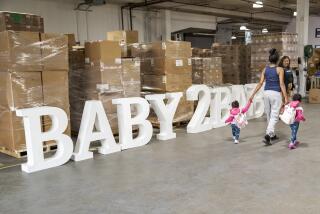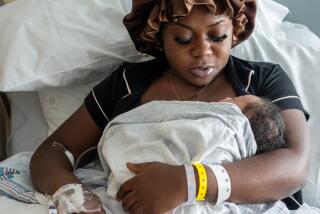Nursery Gives High-Risk Infants Special Treatment Close to Home
LA MIRADA — Dallas Bouchard was born 10 weeks prematurely. He weighed the same as a phone book and was just a shade longer than an envelope when delivered at the Medical Center of La Mirada on Sept. 22.
Because of his size and premature birth, the physicians and nurses who teamed to deliver Dallas feared infections might threaten his tiny organs. As a precaution, babies like Dallas born at La Mirada were routinely separated within minutes of birth from their mothers and transferred to bigger regional medical facilities equipped to care and monitor undersized or critically-ill newborns.
But Dallas was never flown by helicopter to Memorial Medical Center of Long Beach or UCI Medical Center in Santa Ana, two of the state’s best at treating critical newborns.
He never left the La Mirada hospital or his mother because of a new program that cares for all but the sickest newborns at the facility.
A “special care nursery” opened at La Mirada in early September and Dallas was its first “graduate.”
The Bouchard baby spent six weeks in the nursery before making the three-block trip home last week with his parents to meet his five brothers and sisters.
Born just a gram over three pounds--about half the weight of a normal baby--Dallas would have been transferred to Long Beach Memorial the night he was born, said obstetrician Mahpara Razi, who delivered Dallas. Until the new nursery opened, Razi and other physicians say La Mirada lacked the monitoring tools, special incubators and trained staff needed to care for premature babies as they build immunities and weight in the first weeks of life.
While most healthy babies are released from the hospital within five days of birth, premature or sick babies are often kept weeks because of susceptibility to disease and sudden complications.
If Dallas had gone to Long Beach Memorial, Razi said the so-called “bonding process” between the baby and parents--the formation of emotional ties that psychologists say occurs with cuddling, observing and talking to the newborn in the first hours and days following birth--would have been disrupted.
Dennis Gaschen, communications director at the La Mirada hospital, smiled and put it this way: “There was concern babies were growing more attached to the helicopters than their mothers.”
Dallas’ parents admit traveling to Long Beach to be near him would have been a hardship.
Released from the La Mirada hospital three days after delivery, Kim Bouchard, 30, returned to the medical center daily, bringing little stuffed animals or music boxes that nurses placed in her son’s incubator, where his body temperature, food and oxygen were regulated. Her husband, Don, a plant manager at a steel fabrication company in Santa Fe Springs, was able to visit and hold his son during his lunch hour and after work because his office is only minutes from the hospital.
Cleared to Go Home
“We would never have been able to see him as much if he had been 22 miles down the freeway in Long Beach,” said Don Bouchard, cradling Dallas the day after the infant was cleared to go home. In 45 days at the hospital, Dallas gained 1 1/2 pounds.
“What with the other children and work, it would have been near impossible to see him more than a couple times a week,” he said. “This way, he’s been with us every day--a part of our family in a real way. His brothers and sisters were able to see him more often.”
While most area hospitals, like La Mirada, offer traditional maternity services--labor, delivery and nursery care for healthy, full-term babies--the vast majority leave the handling of premature newborns or those considered “high-risk” because of genetic or developmental complications discovered during pregnancy to a handful of specially-equipped and staffed institutions like Long Beach Memorial or UCI Medical Center.
But Edward Fox wanted to change that when he became executive director of the 141-bed La Mirada hospital in October, 1984.
There was no reason, the hospital administrator said, that relatively healthy, premature babies who simply need extra attention and a longer hospital stay could not remain where they were born, close to loving parents and family physicians. Fox insisted that separating infants, like Dallas, from their mothers was unnecessary. He also saw a chance to give the hospital a competitive edge over other area medical centers in an era of deregulated health care.
Special Care Nursery
So Fox approached doctors at the University of California, Irvine, Medical Center in Santa Ana about establishing an intermediate or special care nursery at his hospital, which is undergoing a $15-million expansion started soon after being purchased two years ago by a San Fernando Valley-based company, Nu Med Hospitals.
An agreement between the La Mirada hospital and UCI on the nursery was reached earlier this year. Both sides apparently benefited.
The university staffs La Mirada around the clock with a “neonatologist”--a physician who specializes in the care of newborns, particularly premature infants, during their first days of life. At the same time, UCI officials have coordinated the setup of the nursery as well as providing ongoing training of the La Mirada’s obstetric nursing staff. In return, La Mirada agreed to transfer any critically ill babies to UCI Medical Center for treatment. The La Mirada hospital also pays the neonatologists’ salaries.
One of the neonatologists assigned to La Mirada, Catherine Poon, believes the nursery will minimize movement of babies between facilities, reducing stress caused by such a move on a newborns’ fragile nervous system.
“Some babies must be transferred. In those cases, the pluses far out weigh the risks,” Poon, who assisted in Dallas’ birth, said. “But anytime a baby is moved so soon after birth there is a risk of causing stress that could lead to complications.”
Could Save a Life
Jack Sills, a pediatrics professor at UCI and director of La Mirada’s new nursery, believes there’s another advantage, one that could eventually save a life.
With fewer babies coming to UCI, Sills said there are more beds at the university hospital for critically ill newborns. Unlike La Mirada or other neighborhood hospitals, UCI and Long Beach Memorial each have the staff and equipment to perform emergency surgery and heart, brain or spinal treatments and examinations on newborns.
“Our role is to treat the sickest babies. It doesn’t make sense for smaller, local hospitals to try and duplicate our efforts,” Sills said. “But those hospitals can help by taking some of those babies off our hands once the babies are out of danger. In the future, we may establish a series (of) units like the one in La Mirada to augment our efforts.”
But some physicians, like Houchang D. Modanlou, director of newborn services at Long Beach Memorial, question the cost-effectiveness of big medical centers creating satellite nurseries. So far this year, the La Mirada hospital is averaging about 75 births a month, with two to three newborns needing emergency or critical care. Modanlou said that’s not enough critical cases to justify a separate nursery.
Although unfamiliar with La Mirada’s new nursery, Modanlou said the rapid deregulation of the medical industry in recent years has prompted some health-care providers to put the “dollar before the patient,” expanding services before gauging demand.
“Does it make sense to offer a new service that another nearby facility has been successfully offering for years?” said Modanlou, also a UCI faculty member.
A statewide report released last summer showed Long Beach Memorial had the lowest so-called perinatal mortality rate among California’s 350 active maternity hospitals for the fifth consecutive year. The medical center at UCI ranked 21st in the same study, which examined births and deaths of babies during the last 20 weeks of a woman’s pregnancy and the first 28 days of a newborn’s life.
Making Hard Choices
“Medicine has entered a competitive age,” Modanlou said. “Hospitals are making some hard choices about services. Expansion is fine, as long as there is a real need.”
Since La Mirada opened its four-bed, special care nursery, officials said it has had at least two babies there at all times. It has been so successful, spokesman Gaschen said, that plans are in the works to double the size of the unit, which cost an estimated $100,000 to set up.
The major expense, about $48,000, was the purchase of four special domed incubators called Isolettes--home to the Bouchard baby for weeks.
From the outset of the pregnancy, Kim Bouchard’s doctor believed there was a good chance Dallas might be premature and undersized, because Mrs. Bouchard had a history of early labor. There was an added factor.
A year ago, Mrs. Bouchard lost a child at midterm in her pregnancy, which made Razi, chief of obstetrics at La Mirada, even more uneasy about Dallas’ chances. Then, 10 weeks ahead of her mid-November due date, labor started. It was almost a week, however, between the first contraction and Dallas’ birth.
Because mother and baby remained in the same hospital, Dallas’ intravenous diet was supplemented with his mother’s breast milk. She was also able to hold him, albeit with gloves through openings on the side of the incubator.
“Sure, it wasn’t like being to hold him close like my other babies,” Mrs. Bouchard said. “But there was something very special about being able to stare at him, just dreaming about him becoming a little linebacker someday.”
More to Read
Sign up for Essential California
The most important California stories and recommendations in your inbox every morning.
You may occasionally receive promotional content from the Los Angeles Times.










